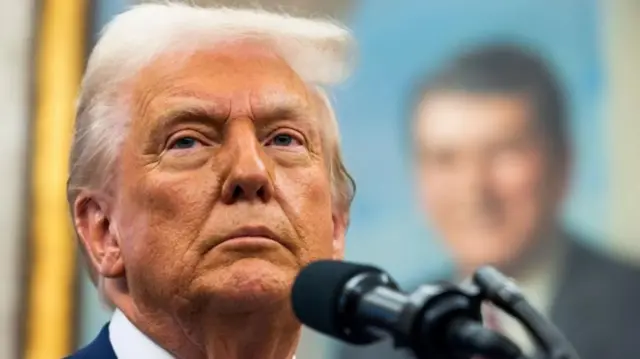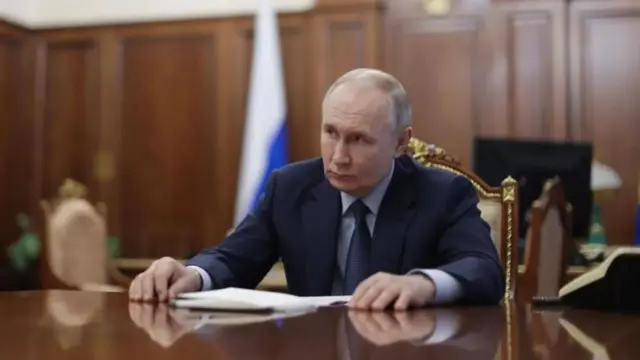Trump and Putin call, say Russia-Ukraine war talks have begun

- Bernd Debusmann Jr., Mike Wendling
- BBC News, White House
U.S. President Donald Trump said he had a "long and productive" phone conversation with Vladimir Putin on Wednesday in which the two leaders agreed to start negotiations to end the war in Ukraine.
Trump posted on his "truth social" platform that he and the Russian president "agreed to have our respective teams begin negotiations immediately" and invited each other to visit their respective capitals.
Ukrainian President Volodymyr Zelensky later said he had discussed "a lasting, reliable peace" with Trump.
In calls with the warring parties, both Trump and his defense secretary said Ukraine was unlikely to join NATO, which would be a huge disappointment to Kiev.
Zelenskiy said he would meet with Vice President J.D. Vance and Secretary of State Marco Rubio at a Ukrainian defense summit in Munich on Friday.
"It is time to stop this ridiculous war, which is causing massive and completely unnecessary death and destruction," Trump wrote on social media. "May God bless the people of Russia and Ukraine!"
He did not set a specific date for the in-person talks with Putin, but Trump later told reporters at the White House: "We're going to be meeting in Saudi Arabia."
Kremlin spokesman Dmitry Peskov said Putin supported Trump's idea and believed it was time for the two sides to cooperate.
Peskov said the call between Putin and Trump lasted nearly an hour and a half, during which the Russian president extended an invitation to visit Moscow.
Trump also told reporters at the White House that Ukraine was unlikely to return to its pre-2014 borders, but in response to questions from the BBC he said "some of the land will be returned".
President Trump said he agreed with Defense Secretary Pete Hegseth, who told a NATO summit earlier on Wednesday that Ukraine could not join the NATO military alliance.
“I think that’s probably true,” Trump said.
The British government said it would continue to support Ukraine against a Russian attack, with Deputy Prime Minister Angela Rayner telling ITV that London's support for Kiev remained "unwavering".
Assessing the mood in the Ukrainian capital, the BBC's Ukraine correspondent James Waterhouse said Hegseth's speech would come as a heavy blow to Kiev.
Our correspondent adds that, despite the fact that it has long been known that the new US administration is less sympathetic towards Ukraine than the previous one, every word of Hegseth will probably only please Moscow.
BBC reporters say that the refusal to join NATO, the belief that Ukraine cannot win, and the vague attitude towards how to regulate the status quo on the front line in the future are all tangible rewards for Russia's 11-year aggression against Ukraine.
Zelensky has repeatedly argued that "there can be no negotiations on Ukraine without Ukraine," but Trump's call with Putin took place in his absence.
Zelensky said he had a "good and detailed discussion" on various issues with Trump and that he also met with U.S. Treasury Secretary Scott Bessent, who was visiting Kyiv.
"No one wants peace more than Ukraine. Together with the United States, we will chart the next steps to deter Russian aggression and ensure a lasting, reliable peace," Zelensky wrote.
The Ukrainian leader added: "We agreed to maintain further contacts and plan upcoming meetings."
According to AFP, the call between the US and Ukrainian leaders lasted for an hour.
In an interview with The Guardian published on Tuesday, Zelensky said Russian-held Ukrainian territory could be swapped for Ukrainian-held territory in Russia’s western Kursk region as part of a peace deal.
Putin's spokesman Peskov called this "impossible."
"Russia has never discussed and will not discuss exchanging its territory. Ukrainian forces will be expelled from this territory. All forces that are not eliminated will be expelled."
Zelensky also insisted that in addition to European countries, the United States should also be part of the country's security plan.
"A security guarantee without the United States is not a real security guarantee," he said.
Moscow annexed the Black Sea peninsula of Crimea after the overthrow of Ukraine's pro-Russian president in 2014 and has backed pro-Russian separatists in a bloody fighting in eastern Ukraine.
Russia invaded Ukraine nearly three years ago, causing the conflict to degenerate into all-out war.
Moscow's attempts to take control of Kiev have been thwarted, but Russian forces have seized about a fifth of Ukraine's territory in the east and south and have carried out air strikes across the country.
Ukraine retaliated with artillery and drone attacks and launched a ground offensive into Russia's Kursk region.
Accurate casualty figures are difficult to obtain because of secrecy by both the Russian and Ukrainian governments, but estimates put the death or injury at hundreds of thousands, mostly soldiers, and the displacement of millions of Ukrainian civilians.
Trump offers Putin a way to get off the bench

The negotiations may have just begun, and it is unclear when and how the parties will end the negotiations.
But Putin had already scored some diplomatic victories with the phone call.
After all, he had been plunged into the political wilderness three years earlier.
At the time, he decided to launch a full-scale invasion of Ukraine, which made him a pariah.
The United Nations General Assembly overwhelmingly adopted a resolution condemning Russia's "illegal use of force against Ukraine."
Russia has since been hit with thousands of international sanctions, and the following year the International Criminal Court issued an arrest warrant for the Kremlin leader.
The then US President Biden also made his position clear, condemning Putin as a "bloodthirsty dictator" or "pure thug."
The year is 2025. A new presidential transition has brought a new style and language, and U.S. policy toward Russia has also changed.
Trump said he wanted to "work very closely" with Putin to end the war in Ukraine and he also hoped they could visit each other's countries.
Apparently, Putin, who invited Trump to visit Moscow, also had this idea.
If the visit goes smoothly, it would mark a major shift in U.S.-Russia relations. It has been more than a decade since a U.S. president visited Russia.
In many ways, Putin has gotten what he wanted — the chance to negotiate directly with the United States on Ukraine, perhaps even bypassing Kiev and Europe — and the chance to thrust himself into the upper echelons of international politics.
But it is unclear how far Putin is willing to compromise.
Russian officials claim that Moscow is ready for negotiations but always refer to Putin’s so-called peace proposal for June 2024, which is more like an ultimatum.
Under the plan, Russia would keep all Ukrainian territory it occupied, as well as some land still under Ukrainian control.
In addition, Ukraine will not be allowed to join NATO and Western sanctions on Russia will be lifted.
As one Russian newspaper put it earlier this week: "Russia is ready to negotiate. But on its own terms."
"If you abandon the diplomatic language, it's essentially an ultimatum."
Comments
Post a Comment